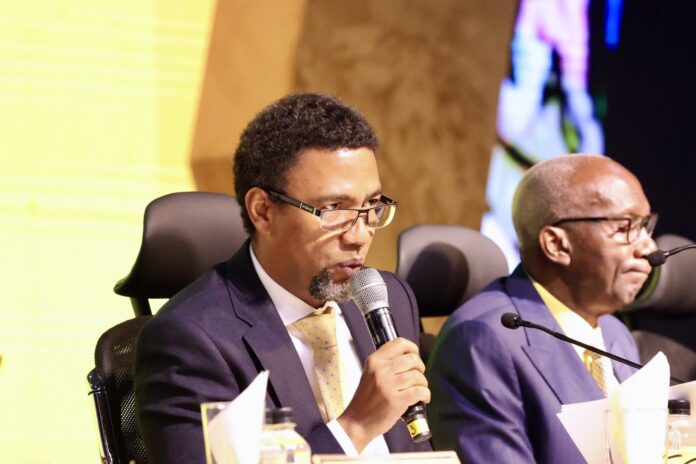MTN Nigeria has officially requested a 100% tariff increase, citing the extreme financial pressures currently crippling the telecommunications sector. This bold proposal, if approved, would double the cost of services for millions of Nigerians. However, despite the urgent plea from the telecom giant, the decision rests with the Nigerian Communications Commission (NCC), and approval is far from guaranteed.
Karl Toriola, the CEO of MTN Nigeria, disclosed the company’s intentions during an interview with Arise TV on Thursday. According to Toriola, the sector’s escalating costs—driven by inflation, fluctuating exchange rates, and skyrocketing prices for diesel and power generation—are pushing telecom operators to a financial brink.
“We’ve formally requested a tariff hike of approximately 100 percent from regulators. But I must admit, I doubt they’ll approve such a steep increase given the current economic climate in the country,” Toriola said, addressing concerns over the potential public backlash.
Crisis Point for Telecom Operators
The request for a tariff adjustment comes at a time when the Nigerian telecom industry is grappling with severe financial and operational challenges. According to Toriola, MTN and other telecom companies are struggling to maintain service quality and expand their infrastructure due to soaring operational costs.
“Running a telecom network has become increasingly unsustainable. Our expenses on fuel, diesel, and power alone have risen dramatically in the last year, while tariffs remain stagnant,” Toriola explained.
In addition to this, the telecom industry faces significant currency devaluation, which impacts the cost of importing critical network equipment. As a result, MTN, like other players in the market, is under immense pressure to raise tariffs or risk crippling service delivery across the country.
The proposed 100% hike would, in theory, allow telecom operators to stabilize their finances. However, this comes at a cost to consumers who are already dealing with Nigeria’s high inflation rate and economic hardship.
“Regulation is not just about profitability; it’s about ensuring the survival of the industry,” Toriola added. “Without this kind of intervention, telecom operators could face massive disruptions, which would have dire consequences for the Nigerian economy.”
‘We Need to Ensure the Sector’s Long-Term Health’
Toriola emphasized that MTN is not seeking short-term profits but rather striving for long-term sustainability. He stressed that the stability of Nigeria’s telecom industry is directly tied to the broader economy, with telecoms being crucial in driving sectors such as banking, education, healthcare, and even agriculture through digital transformation.
“The future of the industry and the well-being of Nigerians depend on a sustainable telecom sector. The policymakers, the regulators, and even the leadership of the Association of Licensed Telecommunications Operators of Nigeria (ALTON) understand this,” Toriola stated.
As the regulatory body, the Nigerian Communications Commission (NCC) must weigh the implications of such a tariff hike. While the NCC is sensitive to the needs of telecom companies, they also have to consider the broader economic conditions that have made the cost of living even more burdensome for Nigerians.
The Sector’s Warning: Service Disruptions Imminent
Earlier this week, ALTON issued a stark warning that without an urgent tariff adjustment, telecom operators might be forced to reduce services, leading to outages and limited network coverage in certain regions of the country.
Engr. Gbenga Adebayo, Chairman of ALTON, described the telecom industry as being “under siege,” pointing to the astronomical costs that operators face in delivering services.
“The situation is becoming unbearable for operators. We cannot continue to provide services at these rates while our operational costs continue to rise. If the tariff adjustment doesn’t happen soon, there will be no option but to scale back services,” Adebayo said.
The telecom operators are not alone in their calls for tariff increases. The Association of Telecommunications Companies of Nigeria (ATCON) has also joined in urging the government to facilitate dialogue between stakeholders to find a sustainable solution to the crisis.
“The government must intervene before things get worse. We need to strike a balance between affordability for the consumers and the viability of the telecom sector. If the situation is allowed to fester, the entire industry is at risk,” said Ajibola Olude, the Executive Secretary of ATCON.
A Growing National Concern
The stakes are high. Nigeria’s telecom sector has long been considered a key pillar of the nation’s economy. The industry contributes significantly to GDP, provides millions of jobs, and plays a vital role in facilitating economic activities, especially with the rise of mobile banking, e-commerce, and digital services.
However, the sector’s rapid expansion and success have been overshadowed by increasing operational costs, which threaten its stability. The telecom companies argue that the current tariff structure, which has remained largely unchanged for several years, is no longer sufficient to cover the rising costs of doing business in Nigeria.
According to Toriola, without an increase in tariffs, telecom companies will be forced to make difficult choices—such as reducing services or cutting back on network expansion—putting the country’s digital future in jeopardy.
“We are in a crisis, but this is not just about us,” Toriola stressed. “This is about the millions of Nigerians who rely on mobile networks for everything from basic communication to financial transactions and e-commerce. The longer we delay finding a solution, the more difficult it will be for the sector to recover.”
The Federal Government’s Role
The Federal Government’s role in resolving the telecom crisis cannot be overstated. The government must strike a delicate balance between protecting consumers and ensuring the sustainability of the telecom industry. Both ALTON and ATCON have called on the government to facilitate a national dialogue to address the root causes of the sector’s financial woes.
“There is a clear need for a collective approach to resolve this. All stakeholders, including the government, the NCC, and telecom operators, need to come together to ensure the long-term viability of the sector,” said Gbenga Adebayo of ALTON.

